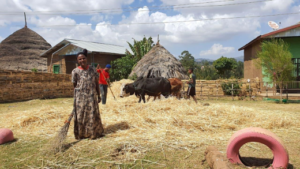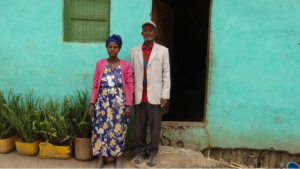To learn more about Digital Green’s AI-powered platform and how it impacts small-scale farmers in India, Ethiopia, Kenya, Nigeria and Brazil, we encourage you to sign up for our newsletter.
Improved agricultural practices that yield happiness and resilient livelihoods

In Ethiopia, Digital Green has been implementing our flagship community video approach to build the capacity of extension agents (known as development agents in Ethiopia) and provide much needed advisory services to farmers. The community video approach trains development agents to produce localized, relevant and timely videos of improved agricultural practices. It also provides with development agents, or mediators, with the skills to facilitate video dissemination sessions that provoke dialogue, answer questions, and collect feedback from farmers.
The following two case studies represent how video extension can be transformative for farmers. Not only can following the video extension advisories yield more production and higher incomes, but also bring happiness and a sense of satisfaction to farmers.
Sinafikish’s Story
Sinaf ikish Bogale lives in Hadiya Zone Lemo Woreda. After her husband passed away, her life changed drastically. Before, she dedicated her time to the household and her six children while her husband managed their one hectare farm, growing bean, wheat, barley, and maize. Her husband used to be an active member of a development group in the area, but Sinafikish had not been involved. After her husband’s passing, Sinafikish began taking a more active role in the farm. She said, “I decided to engage myself in farming. I started communicating with the development agents of my village and actively started attending video dissemination sessions. Even if I did not have prior knowledge and practice of how to prepare land, sowing, harvesting, I have gotten practical knowledge about wheat growing from the video dissemination sessions that I have attended in women development groups.”
ikish Bogale lives in Hadiya Zone Lemo Woreda. After her husband passed away, her life changed drastically. Before, she dedicated her time to the household and her six children while her husband managed their one hectare farm, growing bean, wheat, barley, and maize. Her husband used to be an active member of a development group in the area, but Sinafikish had not been involved. After her husband’s passing, Sinafikish began taking a more active role in the farm. She said, “I decided to engage myself in farming. I started communicating with the development agents of my village and actively started attending video dissemination sessions. Even if I did not have prior knowledge and practice of how to prepare land, sowing, harvesting, I have gotten practical knowledge about wheat growing from the video dissemination sessions that I have attended in women development groups.”
Sinafikish watched videos on various agronomic practices and the discussions with her peers helped her to acquire knowledge about wheat production. Accordingly, Sinafikish has managed to produce and collect 16 quintals of wheat from half hectare and five quintals of broad bean from quarter hectare of land: “Even if I can’t yield as much as my husband used to get and bring to our home, I am working hard to bring back my family’s joy and happiness.”
Ermisa’s Story
 Back in 2019, Ermisa Dindo, a resident of Damboya woreda, used to think of a video-based extension was a waste of time. But he gave it a chance, and now Ermisa is an active attendee of video dissemination sessions. He adopts each practice to the extent possible. Ermisa explains, “I started to practice Teff and wheat row planting after watching the videos. Adopting these practices saved the seed rates and the fertilizer amount per hectare, and there is also a yield difference in the produces. I would also like to diversify my income through cattle farming by improving and crossbreeding local cattle as well as producing vegetable crops.”
Back in 2019, Ermisa Dindo, a resident of Damboya woreda, used to think of a video-based extension was a waste of time. But he gave it a chance, and now Ermisa is an active attendee of video dissemination sessions. He adopts each practice to the extent possible. Ermisa explains, “I started to practice Teff and wheat row planting after watching the videos. Adopting these practices saved the seed rates and the fertilizer amount per hectare, and there is also a yield difference in the produces. I would also like to diversify my income through cattle farming by improving and crossbreeding local cattle as well as producing vegetable crops.”
Ermisa said that the video-based extension approach helps farmers gain knowledge and experience, as well as to adopt different agronomic practices: “By adopting the practices I saw during the video-extension sessions and by accepting the advice of development agents, I have been able to diversify my income and improve my living condition. My family has enough money to send the children to schools, to buy quality clothes and get nutritious food.”